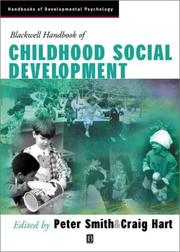| Listing 1 - 4 of 4 |
Sort by
|
Book
ISBN: 9781405196796 Year: 2011 Publisher: Malden : Wiley-Blackwell,
Abstract | Keywords | Export | Availability | Bookmark
 Loading...
Loading...Choose an application
- Reference Manager
- EndNote
- RefWorks (Direct export to RefWorks)
"Building on the success of the highly acclaimed first edition, The Wiley-Blackwell Handbook of Childhood Social Development, Second Edition continues with its presentation of the most thorough, authoritative, and up-to-date overview of research and theory concerning children's social development from pre-school age to the onset of adolescence. Contributions from an international cast of leading experts in their respective fields incorporate the latest findings and developments in each of the topics covered in the first edition - ranging from the family context, the peer group, social skills and social cognition, play, helping and moral reasoning to cooperation, competition, aggression and bullying, as well as children with special needs. This new edition is revised and updated throughout; it includes new chapters on issues such as children and the environment, cultural influences, the history of childhood, interventions, and neuro-psychological perspectives. Each chapter summarizes existing knowledge in the field, synthesizing the latest research in an accessible manner, while at the same time highlighting areas of emerging interest and growing debate. Editorial commentaries prefacing each section provide further synthesis and clarity for the topics covered. The Wiley-Blackwell Handbook of Childhood Social Development, Second Edition presents students, practitioners, and researchers alike with an invaluable resource for accessing the latest research and theories that shape our understanding of the social development of children"--
Developmental psychology --- Child psychology --- Psychologie du développement --- Enfants --- Social aspects --- Aspect social --- Psychologie --- Social aspects. --- Psychologie du développement

ISBN: 0631217525 9780631217527 0631217533 9780631217534 Year: 2002 Publisher: Oxford, UK ; Malden, MA Blackwell Publishers
Abstract | Keywords | Export | Availability | Bookmark
 Loading...
Loading...Choose an application
- Reference Manager
- EndNote
- RefWorks (Direct export to RefWorks)
Developmental psychology --- Age group sociology --- Child psychology --- 189.1 Kinderrechten en gezondheidszorg - Algemeen --- Child Development --- Social Environment --- Infant Development --- Development, Child --- Development, Infant --- Psychology, Child --- Growth --- Environment, Social --- Social Ecology --- Ecologies, Social --- Ecology, Social --- Environments, Social --- Social Ecologies --- Social Environments --- Environment --- Development (Psychology) --- Developmental psychobiology --- Psychology --- Life cycle, Human --- Behavior, Child --- Child behavior --- Child study --- Children --- Pediatric psychology --- Child development --- Child psychiatry --- Child rearing --- Educational psychology --- Social aspects --- Ontwikkelingspsychologie --- sociale en morele ontwikkeling. --- Sociale en morele ontwikkeling. --- Social Context --- Context, Social --- Contexts, Social --- Social Contexts --- Agressivité --- Comportement social --- Développement de l'enfant --- Fratrie --- Harcèlement --- Intégration sociale --- Interaction sociale --- Jeu --- Perception sociale --- Developmental psychology - Social aspects --- Child psychology - Social aspects --- Comportement prosocial --- Dimension historique --- Relation familiale --- Relation parents-enfant --- Developmental psychology. --- Child development. --- Psychologie du développement. --- Enfants --- Société --- Développement.
Book
ISBN: 9781119678991 1119679028 1119678994 1119678978 Year: 2022 Publisher: Hoboken, NJ : Wiley Blackwell,
Abstract | Keywords | Export | Availability | Bookmark
 Loading...
Loading...Choose an application
- Reference Manager
- EndNote
- RefWorks (Direct export to RefWorks)
"The aim of this chapter is to consider how conceptual and investigative trends over the past half-century (i.e., 1970s to 2020s; the "modern era," Collins, 2011) shaped the theoretical and investigative agendas that drive contemporary research on social development. This historical analysis begins by briefly examining some of the ideological and empirical foundations of the modern era. It then proceeds to identify the dominant aims and foci of social development discipline during the past half-century and trace the major research trends and substantive developments that transpired during that epoch. Of particular interest are research agendas that supersede individual substantive areas and thereby exemplify the overarching purposes of the larger scientific enterprise. Finally, this analysis traces some of the conceptual and empirical forces that transformed the discipline, including shifts in explanatory foci and frameworks, the influx of socio-cultural issues and crises, and the introduction of novel research methods and analytic strategies."--
Child psychology. --- Developmental psychology. --- Child development.

ISBN: 1438405960 0585055785 9780585055787 9780791433591 0791433595 9780791433607 0791433609 0791433595 0791433609 Year: 1997 Publisher: New York State University of New York Press
Abstract | Keywords | Export | Availability | Bookmark
 Loading...
Loading...Choose an application
- Reference Manager
- EndNote
- RefWorks (Direct export to RefWorks)
Child development -- United States. --- Curriculum planning -- United States. --- Early childhood education -- Curricula -- United States. --- Interdisciplinary approach in education -- United States. --- Child development --- Curriculum planning --- Early childhood education --- Interdisciplinary approach in education --- Pedagogiek en onderwijskunde --- Curricula --- didactiek naar onderwijsniveau en leerlingkenmerken.
| Listing 1 - 4 of 4 |
Sort by
|

 Search
Search Feedback
Feedback About UniCat
About UniCat  Help
Help News
News